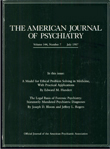Identification of children with pediatric autoimmune neuropsychiatric disorders associated with streptococcal infections by a marker associated with rheumatic fever
Abstract
OBJECTIVE: The authors' goal was to determine whether a trait marker of rheumatic fever susceptibility (labeled D8/17) could identify children with pediatric autoimmune neuropsychiatric disorders (obsessive- compulsive disorder and tic disorders) associated with streptococcal infections (PANDAS). METHOD: Blood samples obtained from 27 children with PANDAS, nine children with Sydenham's chorea, and 24 healthy children were evaluated for D8/17 reactivity. Individuals were defined as D8/17 positive if they had 12% or more D8/17+ cells. RESULTS: The frequency of D8/17-positive individuals was significantly higher in both patient groups than it was among the healthy volunteers: 85% of the children with PANDAS and 89% of the children with Sydenham's chorea, compared with 17% of the healthy children, were D8/17 positive. Further, the mean number of D8/17+ cells was similar in the two patient groups and was significantly higher in these groups than in the group of healthy children. CONCLUSIONS: These results suggest that there may be a subgroup of D8/17-positive children who present with clinical symptoms of obsessive-compulsive disorder and Tourette's syndrome, rather than Sydenham's chorea, but who have similar poststreptococcal autoimmunity.



